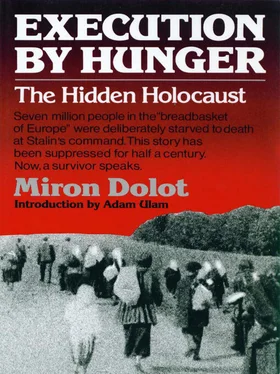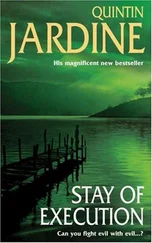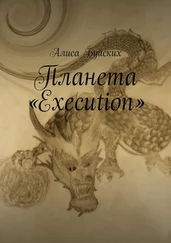The other man watched this whole procedure silently. After the man in the fur coat put his notebook away, they both returned to their sleigh, and passed swiftly by. It was no small effort for us to finally extricate our sledge from the deep snow.
It was quite a relief when we at last reached the cemetery, for we were very cold and utterly exhausted. Here we found ourselves among dozens of corpses. They lay scattered on both sides of the road. Some of them were piled up into heaps—probably all members of one family or of one neighborhood. Others were thrown all over in a haphazard fashion.
The cemetery was deathly quiet. No one was around. Nobody bothered to bury the remains of these miserable wretches.
A “proper” burial in the cemetery in those tragic days consisted of simply depositing the dead in one of the common graves or in graves that had been opened by looters and gold hunters. Even strong grave diggers would have had a hard time digging a grave in that frozen, snow-covered earth. For the ordinary village man, weakened by hunger, it was an impossible job. So we just lowered the bodies of our dead friends into one of the opened graves half filled with snow, and covered them with additional snow. We quickly departed for home.
On the way home, we met a man who lived close to us and was also going in our direction. It was good to have his company. He told us that he had gone to the center to inform the authorities about the great number of people who had starved in his neighborhood and whose unburied corpses remained in the houses and everywhere else. He was very upset by the fact that his story didn’t make any impression on the men in the village soviet, and no one even wanted to believe him. The chairman of the village soviet even went so far as to object to the word “starved” and accused him of misinterpreting the facts. The chairman had his own interpretation. He admitted some deaths, but those could have happened only to the idle and lazy who didn’t like and didn’t want to work in the collective farm or to the “enemies of the people” who had to be exterminated anyway. Our companion realized he could accomplish nothing there. They had no use for further explanations and arguments, so he left the village soviet office an embittered man.
We, in turn, related to him that these same conditions prevailed in our neighborhood, and that we were just returning from the cemetery where we had buried two of our unfortunate neighbors’ children. We also told our companion about our encounter with the two strangers on the way to the cemetery. From him we learned who those men were. The one in the fur coat was the new chairman of the village soviet. He had been appointed to that position by the county government and had just recently arrived in our village. The other man was a journalist sent from the capital city to our village to write an article about progress in collectivization and the meeting of grain delivery quotas. Only now it dawned on us why the man in the fur coat, our new chairman of the village soviet, became so embarrassed and furious when we talked about the corpses of the starved people. It was obvious to us now that he had been trying to hide the terrible reality of the misery of the villagers from his friend the writer.
From that day on we stayed at home, becoming more and more debilitated as the days went by. We watched with great anxiety our last hidden food reserves slowly diminishing, and the cold winter outside still in full swing.
TOWARD the end of March, the famine struck us with full force. Life in the village had sunk to its lowest level, an almost animallike struggle for survival of the fittest.
The village ceased to exist as a coherent community. The inhabitants who still managed to stay alive shut themselves within the walls of their houses. People became too weak even to step outside their doors. Each house became an entity in itself. Visits became a rarity. All doors were bolted and barred against any possible intruders. Even between immediate neighbors, there was little, if any, communication, and people ceased caring about one another. In fact, they avoided each other. Friends and even relatives became strangers. Mothers abandoned their children, and brother turned away from brother.
Some of those who still had strength left continued to forage for food, but as unobtrusively as possible, quietly and stealthily, as if feeling guilty for still being alive.
But what could they find under the snow? On the streets, in the fields, in gardens and orchards, and on the frozen river, everywhere lay the frozen bodies of starved villagers. Their corpses became petrified monuments, perfectly preserved by the snow and frost. They became memorials to the starving children, men and women, old and young: an indictment of official Communist policy and morality.
As the snow continued to fall, the drifts became higher and more inpenetrable. There was no one to clear them from the roads and pathways. Children who used to enjoy playing in the snow, making snowmen, skating and skiing, were nowhere to be seen. Cats used to purr more loudly, and dogs used to bark more lustily in winter. But, by the end of February our village had no pets left: all of them had either starved, become meals for starving families, or been shot by Thousanders. The barns and barnyards had been empty since most of the domestic animals were confiscated by the state and transferred to the kolhosp. A few cows that still remained in the possession of the farmers were well-kept under lock and key as some kind of fabulous treasure. Indeed, even the farm buildings that used to house the domestic animals or serve as storage places, were now practically gone. They had been torn down long ago to be used as firewood. People burned everything in sight to keep warm: even fences, and furniture. In desperation, people dismantled abandoned houses or parts of living quarters.
Death had established its kingdom in our village. No human or animal voices were to be heard. The inhabitants inside their homes were either dead, or barely alive and paralyzed by starvation. Outside, everything was frozen and covered by snow and ice. The only sound that could be heard from time to time was that of the wind howling and whistling. What a contrast from the songs of our nightingales who were destroyed by the Thousanders.
There were other atrocities that no one wanted to talk about. Everyone knew that they occurred, but there seemed to be some taboo about discussing them openly. One of them was the terrible curse of cannibalism. It still is something very difficult to think or talk about.
One must consider the inexorable pressure of hunger under which a person can completely become bereft of his or her senses and sink to an absolute animallike level. That happened to many of our villagers. The more resistant ones who kept on living with minimal or no food at all for some time, felt no more of the initial hunger pangs. They either lapsed into comas, or existed in a semicomatose, lethargic stupor. But some reacted differently. They became like madmen. They lost all traces of compassion, honor, and morality. They suffered from hallucinations of food, of something to bite into and chew, to satisfy the gnawing pains of their empty stomachs. Intolerable cravings assailed them; they were ready to sink their teeth into anything, even into their own hands and arms, or into the flesh of others.
The first rumors of actual cannibalism were related to the mysterious and sudden disappearances of people in the village. Such was the case of Maria and her eleven-year old brother, children of Boris who had been deported long ago as an “enemy of the people.” They disappeared without a trace. Their sick mother plodded from house to house through the deep snow searching for them. They had gone out to bring back firewood but had never returned. The neighbors had not seen the children and did not know anything about their whereabouts. No one was able to help the distraught mother. Then there was a widow who had been existing only on beggar’s handouts. She too disappeared with her daughter, never to be seen again. Soon after that, two other women and a girl were reported missing.
Читать дальше












